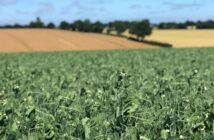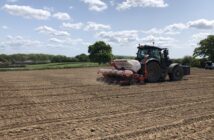Around 60 University of Cardiff students were shown around Bayer and NIAB oilseed rape and wheat variety trials at Callow in Herefordshire this week.
The event was part of Bayer’s ongoing agricultural education programme to promote agriculture as a career of choice, and help train future farmers.
“It’s invaluable for biology students to have access to this type of training from industry experts,” says Jonathon Harrington, visiting lecturer in BioSciences at the University of Cardiff.
“In 2015, I was invited to talk to students on genetics but it soon became apparent that most of them had never been on a farm let alone had an idea of the importance of genetics in agriculture. Today they were able to see at first hand the efforts being made by plant breeders to develop new varieties suitable for a range of agronomic situations here in the UK.”
Plant breeding is a key technology to help increase crop production levels to those required to feed a growing world population, explains Adrian Cottey, Bayer’s Northern European Seeds Manager.
“But it is often a misunderstood technology. Today was a great opportunity for students to learn more about plant breeding, and how it will help both in the future, and on farms today.”
Also on the agenda was learning more about tomorrow’s oilseed rape and wheat varieties, and the characteristics that help growers grow successful crops.
Encouraging young people into a career in agriculture and training new entrants is a vital role companies like Bayer can play a part in, says Mr Cottey.
“It’s why we our keen to be involved and help organise days like this as part of our agricultural education programme.
“In addition to working with universities and agricultural colleges, other activities include helping farmers with training materials for hosting farm visits, in conjunction with Farming and Countryside Education (FACE) and highlighting the best examples with our Bayer / FACE Awards, and giving young people the opportunity to talk about global food security with their peers with our Youth Ag-Summit.”



